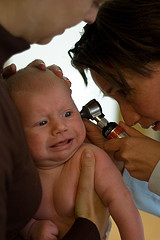12 million Californians are at a greater risk for cancer and other major diseases thanks to HMOs that fail to provide adequate preventive care, according to a Health Care Quality Report Card produced by the California Patient’s Advocate.
studies

Are Companies Finally Figuring Out That Bad Behavior Loses Customers?
A new market research study of over 3600 consumers has confirmed that there are some key things that will quickly erode any trust a customer has in a company: unethical behavior, bad customer service, and outdated products and services. The bad news is that the study was conducted in Europe, which makes us wonder if U.S. companies will pay any attention.

California's Ban On Phthalates May Spread To Other States
Yesterday’s legal action in California against Apple over its use of phthalates may be the opening shot in a nation-wide battle between consumer advocates, health agencies, state and federal entities, and manufacturers of everything from teething rings to consumer electronics to sex toys. Although the ban (which will go into effect Jan. 1, 2009) is limited to California, “lawmakers in Texas, Illinois, Florida, Massachusetts, Maryland, Washington, Maine, Connecticut and New York are expected to introduce similar legislation in the coming months, according to environmental and breast cancer groups that sponsored the California measure.”
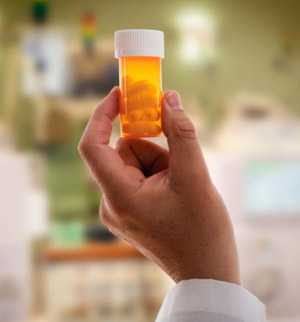
Doctors Say Too Many Patients Can't Name The Drugs They Take
Too many patients don’t remember the names of the medications they’re on, posing problems for doctors who are trying to treat them, warn researchers at Northwestern University’s Feinberg School of Medicine in Chicago. About 40% of the patients surveyed “could not accurately recall what drugs they were taking,” and among those with “low health literacy,” the rate jumped to 60%.

Poverty Makes You Healthier!
The decreased caloric intake and increase in non-motorized modes of transportation following Cuba’s economic crisis from 1989-2000 lead to a decrease in heart disease and diabetes, a University of Michigan study finds.

10 Popular Diets Ranked According To Healthiness
A new report in the Journal of the American Dietetic Association ranks ten diets according to nutritional quality and potential effects on heart health. The best of the ten is the Ornish diet, while the least healthy is the Atkins plan. Dieters, begin fighting.
../../../..//2007/10/01/maybe-television-idiot-syndrome/
Maybe Television Idiot Syndrome (a term we just made up) is reversible: a new study says you can reduce the risk of having an antisocial, depressive child if you reduce his television viewing to less than two hours per day by age 5 1/2. Just make sure you don’t fill up those two hours with Baby Einstein vids. [Reuters]
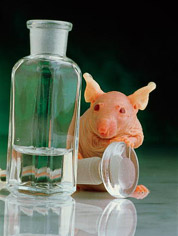
Participating In A Clinical Study? You're On Your Own
The FDA’s own parent department, the Department of Health and Human Services, just issued a report that says the FDA “does very little to ensure the safety of the millions of people who participate in clinical trials,” according to the New York Times. The FDA has 200 inspectors, some of whom are part-time, to monitor 350,000 testing sites—and even when they reported “serious problems,” their findings were downgraded 68% of the time by higher-ups in Washington.

Exercise Doesn't (Necessarily) Make You Lose Weight
Good news if you hate the gym, bad news if you’ve invested your time, money, and faith in the body-shaping power of daily workouts: despite what most people think, there still isn’t overwhelming evidence that exercise will reduce weight. Over the past several decades, research continues to show that exercise will definitely increase your body’s energy needs but not always reduce fat, and that a sedentary lifestyle and obesity are linked but not in a proven cause-and-effect relationship. Meanwhile, the popular press has promoted and mythologized a sort of “faith-based” concept of exercise as a key requirement for weight loss.

Grab Your Sewing Kit: Fake Acupuncture Works!
Score another round—sort of—for alternative medicine. In what may be the funniest medical study fake-out so far, German scientists report that patients who received fake acupuncture in their lower back reported relief at almost-but-not-quite the same rate as those who received legit acupuncture: 44% of patients improved, versus 47% of those who received real acupuncture and 25% of those who received conventional treatment reported improvements.

Exercise Helps Depression As Well As Meds, Says New Study
If you’re blue, but not into treatments that require a prescription, hit the gym. In a recent study of 202 depressed adults, researchers found that those who participated in “group-based exercise therapy” showed the same results as those treated with antidepressants, while those who exercised at home showed slightly less improvement, and those who were given a placebo pill remained depressed.

Pay More Attention To What You Eat At "Healthy" Restaurants
That councilwoman from L.A. isn’t going to like this: a new study says that when people eat at what they perceive to be “healthy” restaurants, they underestimate the calories, which could help explain why Americans are continuing to get fatter even as healthy restaurants have grown faster than fast food restaurants over the past 5 years.
../../../..//2007/09/12/researchers-find-that-shopping/
Researchers find that shopping malls can encourage healthier “incidental activity” by placing signs next to stairwells that read, “Take the Stairs,” which caused a 190% increase in stair activity over three weeks. Or, just do what most the stores in NYC do and make sure at least one escalator is out of service at all times. [Reuters]
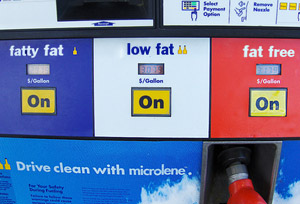
Great News! Higher Gas Prices "Good" For You!
A new study from Washington University claims that “the 13 percent rise in obesity between 1979 and 2004 can be attributed to falling pump prices,” and that if gas prices were raised by $1 more, obesity levels would drop by 15% over the next 5 years. Apparently the closer the cost of a gallon of gas comes to a monthly gym membership fee, the more gym-like qualities it magically takes on.

Apparently Marketers Still Have A Lot To Learn
Adweek reports that in a recent Nielsen study of shoppers’ in-store behavior, even the study authors were surprised to discover how little some marketers seem to know about what works and what doesn’t. First, they determined how we shop for specific product categories:
Heartburn Drugs Prilosec and Nexium May Cause Heart Attacks
The FDA has launched a safety review of the heartburn drugs Prilosec and Nexium after two studies linked the medicines to an increased risk of: “heart attacks, heart failure, and heart-related sudden death.” The FDA warned that the studies are only preliminary, and that doctors and patients should keep using the drugs. From the LA Times:
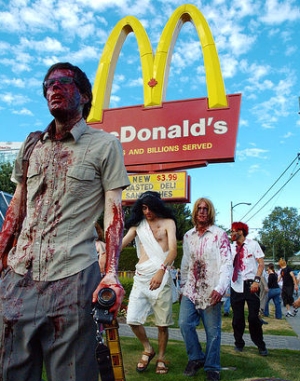
Study Shows Fast Food Zombies Are Made At An Early Age
A new study is reporting that very young children are highly susceptible to the daily onslaught of branded fast food advertising: “most 3- and 5-year-olds who taste-tested a variety of foods said they preferred the ones in the McDonald’s wrapper — even though the foods were exactly the same.”

Despite Ban, Fries From Burger King And Wendy's Still Contain Too Much Trans Fat
A report from the Center for Science in the Public Interest found that fries from Burger King and Wendy’s still contain too much trans fat, despite a recent ban imposed by New York City. The CSPI made the discovery after shuttling fries from Burger King, Wendy’s and McDonald’s to an independent lab. Tests showed that fries from both Burger King and Wendy’s contained more than 3 grams of trans fat per serving, compared to McDonald’s fries, which contained only 0.2 grams of trans fat per serving. The chains are not violating New York City’s ban on trans fat, yet.


